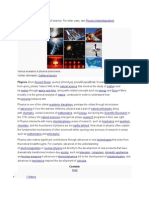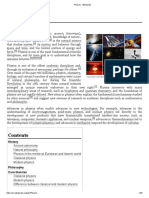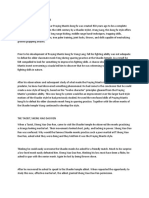Physics (From: Physik (Epist Mē)
Uploaded by
JonardTanPhysics (From: Physik (Epist Mē)
Uploaded by
JonardTanPhysics (from Ancient Greek: φυσική (ἐπιστήμη), translit. physikḗ (epistḗmē), lit.
'knowledge of nature', from
φύσις phýsis "nature")[1][2][3] is the natural science that studies matter[4], its motion, and behavior through space
and time, and that studies the related entities of energy and force.[5] Physics is one of the most fundamental
scientific disciplines, and its main goal is to understand how the universe behaves.[a][6][7][8]
Physics is one of the oldest academic disciplines and, through its inclusion of astronomy, perhaps the oldest.[9]
Over much of the past two millennia, physics, chemistry, biology, and certain branches of mathematics, were a
part of natural philosophy, but during the scientific revolution in the 17th century these natural sciences
emerged as unique research endeavors in their own right.[b] Physics intersects with many interdisciplinary areas
of research, such as biophysics and quantum chemistry, and the boundaries of physics which are not rigidly
defined. New ideas in physics often explain the fundamental mechanisms studied by other sciences[6] and
suggest new avenues of research in academic disciplines such as mathematics and philosophy.
Advances in physics often enable advances in new technologies. For example, advances in the understanding of
electromagnetism and nuclear physics led directly to the development of new products that have dramatically
transformed modern-day society, such as television, computers, domestic appliances, and nuclear weapons;[6]
advances in thermodynamics led to the development of industrialization; and advances in mechanics inspired
the development of calculus.
You might also like
- This Article Is About The Field of Science. For Other Uses, SeeNo ratings yetThis Article Is About The Field of Science. For Other Uses, See4 pages
- This Article Is About The Field of Science. For Other Uses, SeeNo ratings yetThis Article Is About The Field of Science. For Other Uses, See3 pages
- Cyy Y Yy×Y Yyyy Y Yy Yyy: Å Yy Y "Y Yy# Yy "Y 0 "Y "Y Yy YyNo ratings yetCyy Y Yy×Y Yyyy Y Yy Yyy: Å Yy Y "Y Yy# Yy "Y 0 "Y "Y Yy Yy3 pages
- Physics: Jump To Navigation Jump To SearchNo ratings yetPhysics: Jump To Navigation Jump To Search6 pages
- Science: Science (From The Latin Word Scientia, MeaningNo ratings yetScience: Science (From The Latin Word Scientia, Meaning41 pages
- A War Dance Is A Dance Involving Mock CombatNo ratings yetA War Dance Is A Dance Involving Mock Combat1 page
- Al Ayyala Dance Also Generally Known As Yowalah Is A Traditional Group Dance of United Arab EmiratesNo ratings yetAl Ayyala Dance Also Generally Known As Yowalah Is A Traditional Group Dance of United Arab Emirates1 page
- What Is Research: Definition: Qualitative Research Quantitative ResearchNo ratings yetWhat Is Research: Definition: Qualitative Research Quantitative Research2 pages
- Al Ayyala Dance Also Generally Known As Yowalah Is A Traditional Group Dance of United Arab EmiratesNo ratings yetAl Ayyala Dance Also Generally Known As Yowalah Is A Traditional Group Dance of United Arab Emirates1 page
- How Does A Research Paper Differ From A Research ProposalNo ratings yetHow Does A Research Paper Differ From A Research Proposal5 pages
- Part II: Answer The Following. Yes No Part II: Answer The Following. Yes NoNo ratings yetPart II: Answer The Following. Yes No Part II: Answer The Following. Yes No2 pages
- Shinto Japan: Kamidana (神棚 kami-dana, lit. "god-shelf") are miniature household altars provided to enshrineNo ratings yetShinto Japan: Kamidana (神棚 kami-dana, lit. "god-shelf") are miniature household altars provided to enshrine1 page
- Schools Division Office Camarines Norte: Rumil Salvador Tivera100% (2)Schools Division Office Camarines Norte: Rumil Salvador Tivera2 pages
- Filipino Province Philippines Calabarzon Manila José Rizal Metro Manila Bulacan Quezon Laguna Laguna de Bay Sierra Madre Antipolo Pasig Metro ManilaNo ratings yetFilipino Province Philippines Calabarzon Manila José Rizal Metro Manila Bulacan Quezon Laguna Laguna de Bay Sierra Madre Antipolo Pasig Metro Manila1 page
- Rodrigo "Rody" Roa Duterte (Digong,: TagalogNo ratings yetRodrigo "Rody" Roa Duterte (Digong,: Tagalog1 page
- Experience Education Cover Letter Employer Screen Interview Curriculum VitaeNo ratings yetExperience Education Cover Letter Employer Screen Interview Curriculum Vitae1 page






















































































